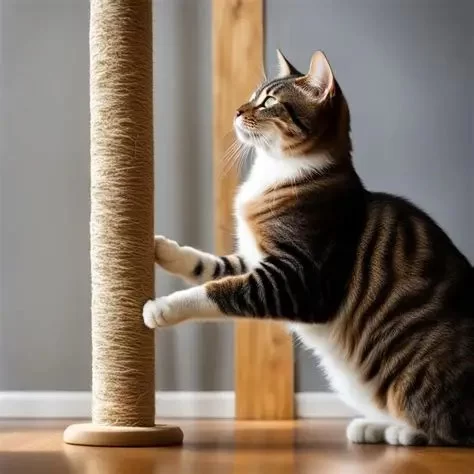Why Is My Cat Excessively Scratching the Walls? Causes and Solutions
- Why Do Cats Scratch?
- Common Causes of Excessive Scratching
- How to Stop Your Cat from Scratching the Walls
- When to See a Vet for Scratching Issues
- Why Choose Hidden Brook Veterinary
Why Do Cats Scratch?
Scratching is a natural and instinctive behavior for cats. It's their way of marking territory, sharpening their claws, and stretching their muscles. While scratching is normal, excessive scratching at walls or furniture can be a sign of underlying issues. In 2025, understanding the reasons behind your cat’s scratching can help you address the behavior effectively.
Scratching is also a way for cats to release stress or frustration. Cats may scratch in areas that provide both physical and psychological satisfaction, like walls, carpets, and furniture. However, when this behavior becomes excessive, it could indicate a deeper problem that needs attention.
Common Causes of Excessive Scratching
If your cat is scratching walls excessively, it’s important to understand the root cause. Here are some of the most common reasons:
1. Territory Marking
One of the main reasons cats scratch is to mark their territory. Cats have scent glands located in their paws, and when they scratch surfaces like walls, they leave behind a scent that marks the area as their own. If you’ve recently added a new pet or made changes to your home, your cat may be using scratching as a way to re-establish their dominance or secure their space.
2. Boredom or Lack of Stimulation
Another reason for excessive scratching is boredom. If your cat isn’t receiving enough physical or mental stimulation, they may resort to scratching as a way to relieve their energy. Cats are naturally curious and active animals, and when they don’t have toys or other activities to engage with, they may focus on scratching walls as a form of entertainment.
3. Stress and Anxiety
Stress and anxiety can also cause cats to scratch excessively. If there have been changes in their environment—such as a move, a new family member, or loud noises—your cat may scratch more as a coping mechanism. Anxiety-induced scratching is usually accompanied by other signs of distress, such as hiding or changes in eating habits.
4. Health Issues
In some cases, excessive scratching can be a symptom of underlying health problems. Conditions such as flea infestations, allergies, or even arthritis can cause discomfort, leading to increased scratching. If your cat is scratching the walls and exhibiting other signs of illness (like hair loss, redness, or sores), it may be time to consult a vet.
5. Claw Maintenance
Sometimes, cats scratch excessively simply to maintain their claws. Scratching helps cats keep their claws sharp and free from overgrowth. However, if your cat’s scratching becomes persistent and focused on walls or furniture, it could indicate that they’re not satisfied with their scratching posts or surfaces.
How to Stop Your Cat from Scratching the Walls
If you’re dealing with a cat that’s scratching the walls excessively, there are several strategies you can try to stop the behavior:
1. Provide a Scratching Post
Ensure your cat has access to an appropriate scratching post or pad. Cats are more likely to scratch surfaces that are rough and satisfying to their claws. Place the scratching post near the areas where your cat tends to scratch the most, such as walls or furniture.
2. Use Cat Furniture or Scratching Pads
In addition to traditional scratching posts, consider investing in cat furniture that incorporates scratching surfaces. This will encourage your cat to scratch on designated items rather than your walls. Scratching pads, especially those made of cardboard or sisal, are often irresistible to cats.
3. Apply Deterrents
If your cat insists on scratching certain areas, such as walls, you can apply safe deterrents. Products like double-sided tape or sprays designed to discourage scratching can be helpful. Cats dislike the sticky feeling of tape or the scent of certain sprays, which may help break the habit.
4. Ensure Plenty of Playtime
Providing your cat with regular play sessions is crucial for reducing boredom. Interactive toys, laser pointers, or puzzle feeders can help stimulate your cat’s mind and reduce the urge to scratch out of frustration or anxiety. Playtime can also be an excellent bonding opportunity.
5. Manage Stress and Anxiety
If stress or anxiety is the cause of your cat’s excessive scratching, try to identify the source of their distress. Creating a calm, quiet environment, reducing loud noises, and maintaining a consistent routine can help alleviate anxiety. In some cases, your vet may recommend pheromone diffusers or calming collars to help soothe your cat.
When to See a Vet for Scratching Issues
If your cat’s scratching becomes excessive and persistent despite your efforts to manage the behavior, it’s time to consult a veterinarian. A vet can assess whether the scratching is related to a medical condition, such as skin infections, allergies, or arthritis. If behavioral factors are at play, your vet may recommend a behavioral consultation to help correct the issue.
Why Choose Hidden Brook Veterinary
At Hidden Brook Veterinary, we understand how frustrating it can be when your cat exhibits problematic behavior, like excessive scratching. Our experienced team can help you identify the root cause of your cat’s behavior and provide solutions to improve their quality of life. Whether your cat’s scratching is due to medical issues or behavioral factors, we offer expert care and guidance tailored to your pet’s needs.
If you're looking for advice, products, or treatments for your cat’s health or behavioral issues, visit Hidden Brook Veterinary today. We're here to help your cat live a happier, healthier life.












